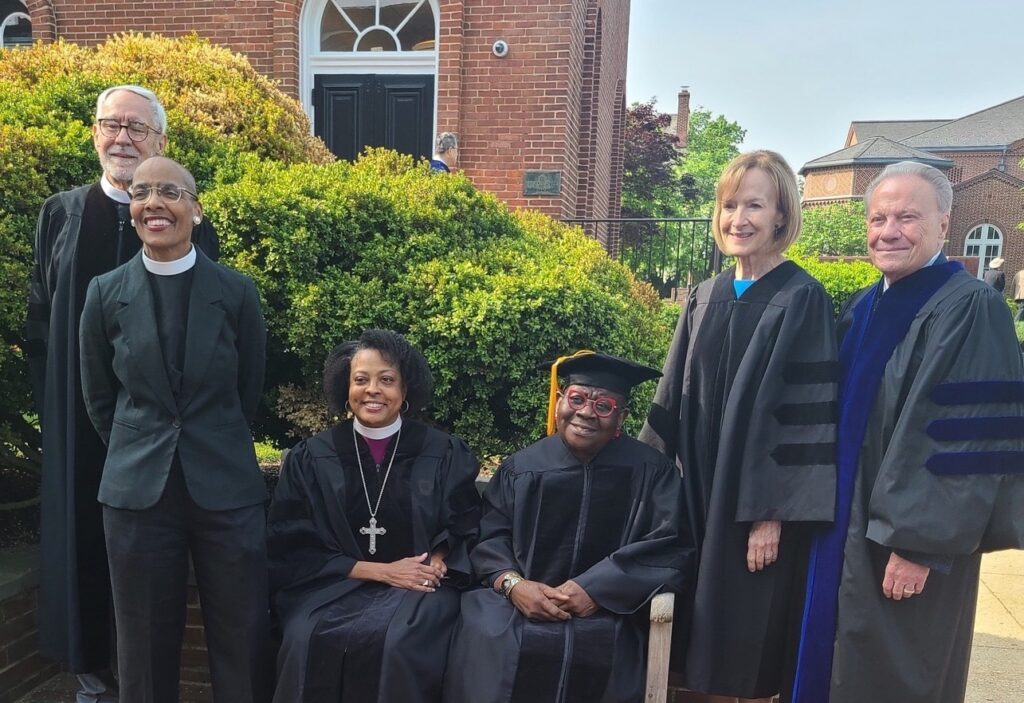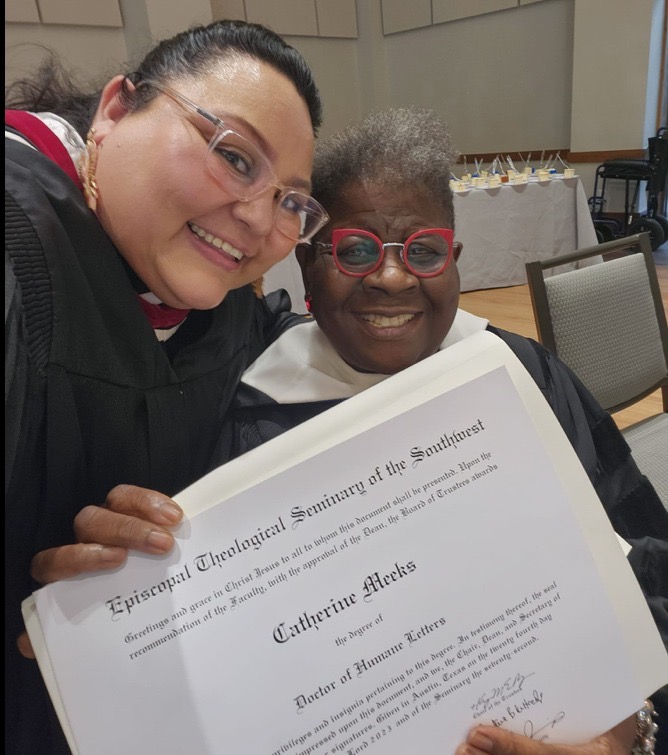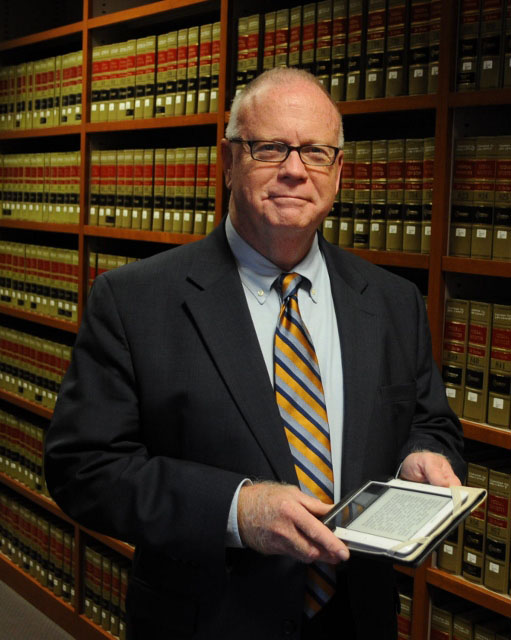
Founding Executive Director of the Absalom Jones Episcopal Center for Racial Healing Dr. Catherine Meeks keeps a busy travel schedule educating audiences worldwide on the best practices for healing racial divides.
Now Dr. Meeks is racking up more travel miles receiving honorary degrees, awards, and recognitions for her decades of work.
Most recently, Dr. Meeks received honorary doctorate degrees from the Virginia Theological Seminary and Seminary of the Southwest, and she is scheduled to receive a third from The Berkeley Divinity School at Yale.
These honors come in addition to other recognitions, including the Presidential Award Lifetime Achievement Honoree, the President Joseph R. Biden Lifetime Achievement Award, and the Presidential Volunteer Service Award medal.
“I feel deeply honored to receive such amazing affirmations as is provided by the conferral of the Doctor of Divinity degree from VTS and Doctor of Humane Letters from Seminary of the Southwest and I accept them with deep gratitude for myself and for my mother and all of my foremothers who were as smart and many times smarter than I am and who worked hard without receiving any affirmation,” Meeks said.
“I will hang these degrees on my wall and delight each day in knowing that there are many who have gone before me that are rejoicing with me.”
Meeks has been involved in racial justice work for her entire adult life. She led the Diocese of Atlanta’s racial reconciliation work prior to establishing the Absalom Jones Center in 2017.
She has become well-known worldwide after growing The Center into a resource for the Episcopal Church and the larger community to engage in dismantling racism through education, prayer, dialogue, pilgrimage, and spiritual formation.
The year before founding The Center Meeks explained how her work had evolved in a document shared with the Atlanta Diocese, entitled A New Vision.
“Beloved Community: Commission for Dismantling Racism is the name that we chose when we renamed our anti-racism commission. When our new Bishop, Robert Wright, met with us he asked that we consider a name change because there was so much negative reaction to the name that we had.
“After much conversation and reflection, we agreed upon the current name. This name actually embodies our vision. We are trying to help construct the beloved community and in order to do that, racism has to be dismantled. This change has generated much positive energy.
“Along with this change, we made another very significant change regarding our training. We added the celebration of Holy Communion to each training session. Though the celebration at the table is never a small matter, this change has had a phenomenal impact upon the quality of response to the training. Even the reluctant participants who attend the required training seem to find themselves more able to engage in the day’s hard work than was true before we began starting the sessions in this way.”
For Meeks, taking on the challenge of racial healing work throughout The Episcopal Church is a natural progression of her lifetime work for social change.

Her first activist stance was leading demonstrations while an undergraduate at Pepperdine University, which she spoke about during a 2021 presentation at Pepperdine.
After graduating from Pepperdine in 1970 with a Bachelor of Arts degree in Speech Education she earned a master’s degree in social work from Clark Atlanta University and a Ph.D. from Emory University.
Dr. Meeks went on to a 25-year career at Mercer University as an assistant dean of women, instructor, and assistant professor before Macon Georgia Mayor Jim Marshall asked her to lead the Youth Violence Prevention Task Force for two years. That led to her being recruited by Wesleyan College to be the Clara Carter Acree Distinguished Professor of Socio-Cultural Studies for nine years until her retirement in 2008.
Dr. Meeks says her faith inspired her to work for racial healing as well as her personal experiences and her passion for justice. Growing up in Arkansas during the Jim Crow era she saw and experienced the racial violence, discrimination, and oppression that plagued the African American community.
Dr. Meeks credits her mother with teaching her to love God and to love herself as a child of God. She also learned from her mother the importance of education, resilience, and compassion.
“It is so ironic that my mother graduated from college the same year that I graduated from high school and had to take classes through the mail and what was called extension college for eighteen years in order to finally receive a bachelor’s degree and that in eighteen years, I was able to graduate from college, then go on to, receive a Masters in Social Work Degree, a Ph.D. and now two honorary doctorates with a third one to be awarded from the Berkeley Divinity School at Yale next year,” Meeks said.
“This realization is a part of the reason that I work so hard to make the world a better place, because my blessings are so much greater than my mother’s, who modeled for me the value of being faithful and focused even in the midst of major hardship and scarcity. My work is a way to practice good stewardship for the many blessings that have been given to me.”
Those early teachings motivated Meeks to serve God and God’s people through her ministry of racial healing. She believes that racism is a sin that wounds the human family, and that healing is possible through God’s grace and love. She also believes that racial healing is a spiritual journey that requires honesty, humility, and hope.
Dr. Meeks has produced several books on racial justice and healing. She is the editor of Living into God’s Dream: Dismantling Racism in America and she co-authored Passionate for Justice: Ida B. Wells as a Prophet of our Times with Nibs Stroupe, a retired Presbyterian pastor, author, and community social justice leader. The book examines the life and times of Ida B. Wells, a powerful churchwoman and advocate for social justice from 1878 to 1931. The book is described as a compass that points us to the future, where we can each give voice and action to justice, equity, and life-giving community.
Dr. Meeks latest book is The Night is Long but Light Comes in the Morning: Meditations for Racial Healing, described as a spiritual guide to restoring yourself from racial trauma and committing to the long work of dismantling racism. Her podcast A Few Shades Braver features Dr. Meeks in conversation with leaders and activists on racial justice issues.
The Absalom Jones Center is located next to The Atlanta University Center. It is an inter-generational, faith-based organization that supplies curriculum, activities, and experiences to all participants to engage their heads and their hearts in the daily work of dismantling personal prejudice and ending systemic racism.
The Center is named after Absalom Jones, the first African American priest in the Episcopal Church, who was born into slavery in 1746 and became a leader in the abolitionist movement. The Center’s logo features two African symbols that stand for support, cooperation, reconciliation, and peacemaking.
The Center offers programs and resources, including Sacred Ground, a film-based dialogue series on race and faith; pilgrimages to historical sites related to racial justice; workshops on topics such as implicit bias, cultural competency, and storytelling; and a virtual library with books, videos, and articles on racial healing.
The Center’s ongoing mission is to provide tools and experiences that allow faith communities – and the larger community of individuals – to engage in dismantling racism through education, prayer, dialogue, pilgrimage, and spiritual formation.
A joint ministry of The Episcopal Church and The Episcopal Diocese of Atlanta, The Center is part of the Episcopal Church’s vision of Becoming Beloved Community, a long-term commitment to racial justice, healing, and reconciliation.
The Diocese of Atlanta encompasses almost 76 counties and is made up of roughly 50,000 people who follow Jesus in 117 vibrant and diverse worshiping communities. We challenge ourselves and the world to love like Jesus as we worship joyfully, serve compassionately, and grow spiritually. Want to get involved? Find a church or visit our Diocesan website to learn more.

